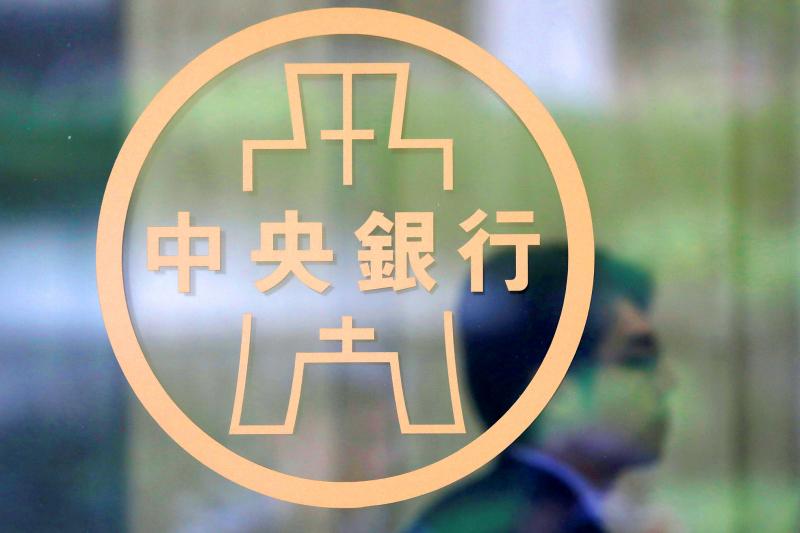Taiwan’s foreign exchange reserves last month rose by US$466 million to a record US$548.87 billion, as exporters offloaded US dollars and local investors raised stakes in US dollar-based assets ahead of anticipated interest rate hikes, the central bank said yesterday.
The nation’s foreign exchange reserve rose for the sixth consecutive month thanks to robust demand from companies and organizations around the world for Taiwan-made electronics needed to drive digital transformation, Department of Foreign Exchange Director-General Eugene Tsai (蔡炯民) said.
Strong exports explain why the New Taiwan dollar appreciated in the past two years, Tsai said, adding that US Federal Reserve’s money-printing program has weighed on the US dollar.

Photo: Tyrone Siu, Reuters
Taiwan’s central bank asked exporters before the Lunar New Year to sell their US dollar possessions at different times to avoid a spike in the local currency’s valuation, Tsai said.
Profitable Taiwanese companies normally distribute year-end bonuses prior to the Lunar New Year, putting appreciation pressure on the NT dollar.
Tsai said the central bank has made the plea throughout the year.
The latest gain in foreign reserves was also linked to the central bank’s management skills, the official said, after the euro softened 1.62 percent, the British pound shed 0.67 percent, the Japanese yen lost 0.27 percent and the Chinese yuan gained 0.13 percent.
“In all, the foreign exchange market saw largely balanced supply and demand,” Tsai said.
Local investors have begun displaying more interest in US dollar-denominated assets after the Fed and other major central banks turned hawkish, Tsai said.
Such movements gain momentum when 10-year US Treasury yields rise above 1.75 percent, he added.
The yield is approaching 2 percent after the Fed last month indicated plans to raise interest rates by 25 basis points next month at the earliest to battle inflation.
Global fund realignments accounted for bond and stock market corrections last month, with wild volatility likely to persist for a short while, Tsai said.
Taiwan last month registered US$1.83 billion of net capital outflows, after foreign portfolio managers remitted US$3.24 billion to Taiwan, but transferred US$5.06 billion of gains abroad, Tsai said.
Local shares, debt and local currency deposits held by foreign players totaled US$735.7 billion, or 134 percent of foreign exchange reserves, he said, adding that the ratio is acceptable.
Taiwan remains the world’s fifth-largest foreign exchange holder after China, Japan, Switzerland and India, the central bank said.

Real estate agent and property developer JSL Construction & Development Co (愛山林) led the average compensation rankings among companies listed on the Taiwan Stock Exchange (TWSE) last year, while contract chipmaker Taiwan Semiconductor Manufacturing Co (TSMC, 台積電) finished 14th. JSL Construction paid its employees total average compensation of NT$4.78 million (US$159,701), down 13.5 percent from a year earlier, but still ahead of the most profitable listed tech giants, including TSMC, TWSE data showed. Last year, the average compensation (which includes salary, overtime, bonuses and allowances) paid by TSMC rose 21.6 percent to reach about NT$3.33 million, lifting its ranking by 10 notches

SEASONAL WEAKNESS: The combined revenue of the top 10 foundries fell 5.4%, but rush orders and China’s subsidies partially offset slowing demand Taiwan Semiconductor Manufacturing Co (TSMC, 台積電) further solidified its dominance in the global wafer foundry business in the first quarter of this year, remaining far ahead of its closest rival, Samsung Electronics Co, TrendForce Corp (集邦科技) said yesterday. TSMC posted US$25.52 billion in sales in the January-to-March period, down 5 percent from the previous quarter, but its market share rose from 67.1 percent the previous quarter to 67.6 percent, TrendForce said in a report. While smartphone-related wafer shipments declined in the first quarter due to seasonal factors, solid demand for artificial intelligence (AI) and high-performance computing (HPC) devices and urgent TV-related orders

Prices of gasoline and diesel products at domestic fuel stations are this week to rise NT$0.2 and NT$0.3 per liter respectively, after international crude oil prices increased last week, CPC Corp, Taiwan (台灣中油) and Formosa Petrochemical Corp (台塑石化) said yesterday. International crude oil prices last week snapped a two-week losing streak as the geopolitical situation between Russia and Ukraine turned increasingly tense, CPC said in a statement. News that some oil production facilities in Alberta, Canada, were shut down due to wildfires and that US-Iran nuclear talks made no progress also helped push oil prices to a significant weekly gain, Formosa said

MINERAL DIPLOMACY: The Chinese commerce ministry said it approved applications for the export of rare earths in a move that could help ease US-China trade tensions Chinese Vice Premier He Lifeng (何立峰) is today to meet a US delegation for talks in the UK, Beijing announced on Saturday amid a fragile truce in the trade dispute between the two powers. He is to visit the UK from yesterday to Friday at the invitation of the British government, the Chinese Ministry of Foreign Affairs said in a statement. He and US representatives are to cochair the first meeting of the US-China economic and trade consultation mechanism, it said. US President Donald Trump on Friday announced that a new round of trade talks with China would start in London beginning today,